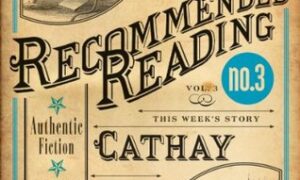 Goodhouse by Peyton Marshall
Goodhouse by Peyton Marshall
My rating: 3/5 cats



The older something is, the more work it is to maintain.
let’s get the ranting out of the way, because while i did enjoy reading this novel as an entertainment, i had some problems with its premise.
this is a near-future mini-dystopia full of environmental disasters and war and social unrest. also in this imagined future, the genetic markers for criminality have been identified, and the male relatives of all convicted felons have been tested for these markers. if they test positive, they are sent to goodhouses as young boys, where they are reprogrammed with routines and “right-thinking” mantras like People are not aware of their limitations because those limitations prevent awareness and hopefully by the time they turn 18, they will have achieved level 1 status, and be able to reintegrate into polite society. yeah, you read that right. only the males. because this genetic marker does not predict shit in girls. which is just kind of glossed over in a couple of sentences as though it is inconsequential.
now, i am not a scientist. i don’t have any responsibility to science to point out others who are being lazy with it. and i have no problem reading books that say “fuck you, science!” as long as the story around it is compelling. and this one just…isn’t. it’s not bad, it’s just nothing new.

now, were this a YA novel, i would be more inclined to raise my fist in the “fuck science!” shout, because plausibility is not necessary to enjoy a good YA-dystoadventure. but it isn’t. and if you’re making me get out my suspension-of-disbelief bonnet, you had better captivate me. but it’s a pretty pedestrian tale, and i’m not sure what sets it apart, except for this genetic premise which doesn’t hold water.
and it’s lunacy—the idea of putting a bunch of teenage boys who have been “scientifically proven” to have a propensity for violent behavior and criminality under one roof and who on top of that have all the normal teenage hormones that boys have, and then denying them the normal social outlets for releasing all this excess energy—deprived of all socializing and sexual development and exercise and treating them like animals who don’t even have their own names or connection to their family, creating all this caged heat and still maintaining this optimistic expectation for seamless integration after so much exclusion…i mean WHAT COULD GO WRONG??

strangely enough, the ultimate opposing force and the danger rarely comes from the powderkeg boys themselves. sure, the proctors and class leaders abuse their status-privileges and take out their frustrations on the lesser boys, but there are also religious revolutionaries called zeros, who attack goodhouses and the boys within, and also some shady mad scientist drug-experimentation going on inside the goodhouses which further exacerbates the situation.
our main character, james goodhouse, is slippery—we don’t always know if he is acting or being acted upon, and he is neither criminal nor heroic. things happen to him and he makes things happen, but in many ways he is simply an observer. his last goodhouse was attacked by the zeros, and he managed to survive, but he is damaged from the incident, beyond the damage you would expect from someone so isolated from a normal existence. sometimes he is drugged and becomes less reliable as a narrator, but he’s not a particularly dynamic character in general. he just seems to be there to build this story around.
there are a couple of moments where i thought something interesting was happening, like in this description of how we manage to acclimate to circumstances that seem unlivable
For the first few hours it seemed impossible that anyone could survive in this room. But then I began to understand how it might happen. A person would change, adapt. The room would alter them. It was already happening. I already knew which corner was the driest. I stood beside the door where the air was better and a small beam of greenish light made it possible for me to see my hand. The process was so simple, so natural—and more than anything I’d felt at Ione, it terrified me. It filled me with an angry resolve, a determination not to change—no matter the circumstance, no matter the room.
and some of the developments towards the end that are too complicated to cliffs notes here were intriguing and seemed to be moving the story in an unexpected direction, but i had too many questions overall, that were inconsequential, but nagging. like like how would he even know what ginger or cinnamon smells like? and how did he meet up with bethany again? everything just seems glossed-over, details elided to get back to the story.
apparently this is based on the preston school of industry, a reform school opened in 1894 which looks like this:

and whose alum include merle haggard, neal cassady, and eddie bunker.
but while there seem to have been some power-abuses at that school and rumors of ghosties, there isn’t anything like the situation described in this book.
so, it’s not terrible, and if you are a fan of these kind of books, it’s definitely worth reading, it’s just for me, there wasn’t anything particularly new being brought to the genre, and nothing memorable about it. but it’s not the worst, despite my cranky review. i’m a crank, don’t listen to me. read a book.
read my book reviews on goodreads







